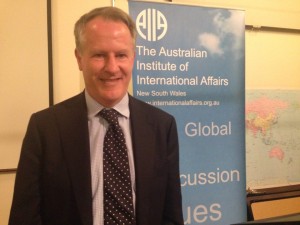Deja vu - military operations in the Middle East
On Tuesday 18 August, Dr Rodger Shanahan, a former professional soldier with a PhD in Arab and Islamic Studies, spoke at a well-attended meeting at Glover Cottages about the complex military situation in the Middle East. Islamic State (IS) was only the latest manifestation of a radical movement active for most of a generation. It could seize and hold ground, defeat significant regional military forces, and wanted to establish an expanding Caliphate, a temporal and spiritual rule according to the will of God. It controlled parts of both Syria and Iraq. Rodger last visited the region in June, and had never seen such a multiplicity of military challenges. Egypt, previously one of the most significant and influential powers in the region, was crippled by internal problems, and distracted by its porous border with Libya. In Iraq and Syria many warring groups and factions existed, including a shifting IS coalition of hard-core salafists and jihadis. There were Baathist remnants, disaffected tribal groups, and a multiplicity of other political and military actors. The Assad regime in Syria was supported to varying degrees by Iran, China and the Russian Federation. NATO wanted a solution without Assad. Meanwhile, millions of civilian refugees from Iraq and Syria were crowded into camps in Lebanon, Jordan and Turkey. Yemen had become a bombing range for the Saudi air force against its main target, the Houthis, but this had not prevented the latter from steam-rolling down to Aden. Jaba’a al Nusra, an affiliate of al Qa’ida, had joined the Houthis. Iran provided nominal support to both.
Obama’s approach to these intractable problems has differed markedly from Bush’s. A Chicago lawyer, a multilateralist, Obama asserted that they could only be solved through negotiations. The successful nuclear deal struck with Iran was evidence of his ‘Doctrine of Responsibility’. The Doctrine supported territorial integrity for all Gulf States, without any guarantee of US military back-up. US military forces would continue to rotate through the region, but without necessarily becoming involved in direct engagement. Many regional actors saw Obama as naive, as wishing to avoid decisive military engagement. They feared that the United States would pull out of the region altogether. Others looked with more optimism towards the end of Obama’s second presidential term with hope that a more interventionist president would supplant him. And Australia’s position? We had in the region six FA-18 fighter bombers, a KC-30A multi-role airborne tanker, an E-7A Wedgetail early warning aircraft and around 600 ADF support and training personnel, some embedded in US forces. According to Rodger, our obligation to be there was moral – we had invaded Iraq in 2003, and must try to put a viable regime back together, at least in Baghdad. But, he admitted in response to a question, Australian forces were not welcomed by the Baghdad regime. The future of the region was bleak. There appeared to be no appetite for reform or conciliation among warring regimes and factions. Religious intolerance reigned, most of all in ISIS, but also in Saudi Arabia. Perhaps the country that showed the least intolerance was Iran.
Report by Richard Broinowski
